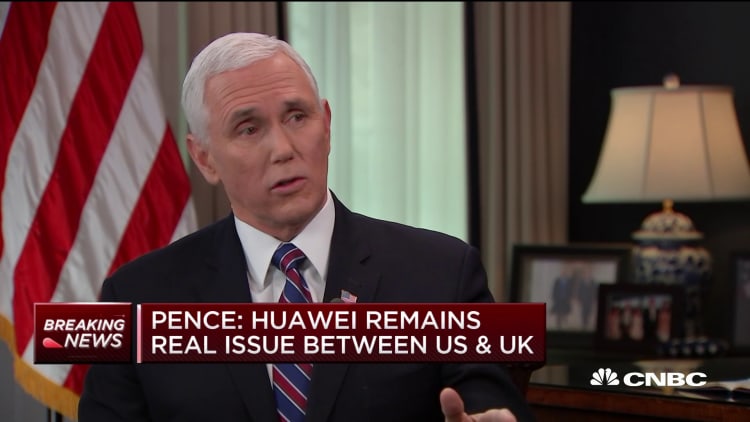MUNICH — As the globe races to develop 5G networks, U.S. House Speaker Nancy Pelosi warned Sunday that accepting Chinese domination of the technology would be akin to "choosing autocracy over democracy."
"This is about choosing autocracy over democracy on the information highway," Pelosi, D-Calif., said during a press conference at the annual Munich Security Conference. "It is about putting the state police in the pocket of every consumer in these countries, because of the Chinese way. And so, you ask about an alternative, and what I said a couple of days ago and yesterday, is that it should not be a sinofication of the information highway but an internationalization of it."
"This is the information highway of the now, and why would we want to give license to the Chinese to direct the traffic on that information highway of the future?" she continued. "It is a big price to pay in terms of national security, in terms of economy and in terms of our values and our governance. And that is why we have bipartisan support for this position. It is not about an economic advantage, it is about a values urgency: autocracy versus democracy. And we choose democracy."
Pelosi had previously warned U.S. allies at the security forum to stay clear of Huawei, calling it "the most insidious form of aggression."
Similarly, Secretary of State Mike Pompeo described Huawei and other Chinese state-backed tech companies as "Trojan horses for Chinese intelligence." Secretary of Defense Mark Esper also said in a speech at the Munich Security Conference that Beijing was carrying out a "nefarious strategy" through telecommunications firm Huawei.
Read more: Pelosi warns US allies: 'Don't go near Huawei'
Their comments come on the heels of new charges brought against Huawei by the U.S. Justice Department and underline bipartisan suspicion of Huawei.
The Trump administration is working to isolate Huawei, the world's largest telecommunications equipment manufacturer, from developing a larger foothold in U.S. partner countries. The administration has specifically worked to keep members of the "five eyes" intelligence-sharing group — the U.S., U.K., Canada, Australia and New Zealand — from working with Huawei.
Last month, the Trump administration expressed disappointment after the U.K. announced it would allow Huawei to have limited access to some British 5G mobile networks. "The United States is disappointed by the U.K.'s decision," a senior Trump administration official wrote in a Jan. 28 emailed statement to CNBC. The official added that the Trump administration will work "with the U.K. on a way forward that results in the exclusion of untrusted vendor components from 5G networks."
U.S. officials have long complained that Chinese intellectual property theft has cost the economy billions of dollars in revenue and thousands of jobs and that it threatens national security. China maintains that it does not engage in intellectual property theft.
On Monday, a White House official told a small group of reporters on the sidelines of the Munich forum that the U.S. wants to develop partnerships with the telecom industry in order to counter Huawei's offerings.
Robert Blair, White House special representative for international telecommunications policy, also called on the U.K. to take a "hard look" at its decision to use Huawei equipment.
Vice President Mike Pence told CNBC last week that London's decision could jeopardize trade talks between the U.K. and the United States.
Read more: Vice President Pence: 'We'll see' if UK decision on Huawei is a deal breaker for a trade pact
"We're anxious to build our economic ties, but we have made it clear to Prime Minister [Boris] Johnson and to officials in the U.K., that as we expand opportunities to build out 5G across this country ... we want to see our companies meet the needs in the United States and U.K. and among all our allies without the compromise of privacy and the compromise of security that necessarily comes with Huawei and control by the Chinese Communist Party," Pence told CNBC's Wilfred Frost.



